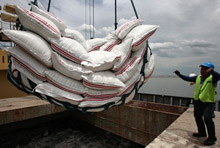
Typical street scene in Santa Ana, El Salvador. (Photo: iStock)
IMF Survey: IMF Warns Gains Against Poverty Are in Jeopardy
December 3, 2008
- Doha development conference reaffirms donors' aid commitments
- Developing countries face difficult times because of global downturn
- IMF welcomes spirit of multilateralism
The IMF warned that the gains made in poverty reduction in low-income countries around the world are in jeopardy because of the dramatic slowdown in the global economy triggered by the world financial crisis.

Global downturn means many low-income countries face shrinking export markets, IMF tells UN development conference (photo: Romeo Ranoco/Reuters)
FINANCING FOR DEVELOPMENT
"The most serious financial crisis in generations has tipped many of the advanced economies into recession. As the credit squeeze spreads and trade flows slow, developing countries face serious setbacks, through no fault of their own," IMF Deputy Managing Director Murilo Portugal told a United Nations conference.
"For the low-income countries in particular, recent gains in poverty reduction and improvements in living standards are now in jeopardy," he said in a speech on December 1 at the U.N. Financing for Development conference in Doha, Qatar.
Cumulative impact
Portugal said that the economies of many low-income countries had already been weakened by the cumulative effects of the food and fuel price surges that peaked in mid-2008 and they now faced a second blow from the global downturn. They were confronted with the prospect of declining private capital flows, as well as shrinking export markets.
He urged donor countries "to scale up development assistance, as pledged, despite the strains on their own budgets caused by the financial crisis."
In a press statement issued on December 2 Portugal welcomed reaffirmations by donor countries at the Doha conference of their commitments to step up aid "as well as to foster mobilization of private financing, enhance delivery of debt relief, and accelerate conclusion of the current round of trade negotiations."
Spirit of multilateralism
Portugal said the IMF, which has 185 member governments, was doing its part. The Fund has increased its financial support to 15 low-income countries during 2008 as well as reforming its Exogenous Shocks Facility to make it quicker and easier to use.
"This conference has demonstrated that the spirit of multilaterism is very much alive. Indeed, there was wide acceptance of the need for broader representation of developing countries in global economic governance. This is a goal that the IMF fully endorses and is pursuing through its own ongoing governance reforms," Portugal stated.
Portugal said low-income countries, for their part, have a responsibility to continue improving their policies to lift people out of poverty, including by making the management of aid and other budgetary resources more effective and transparent.
Mobilizing financing
Heads of state and government ministers from around the world gathered for the November 29-December 2 in Doha for the UN's Follow-up International Conference on Financing for Development to assess progress made on the 2002 Monterrey Consensus, a landmark North-South agreement on development principles.
The conference discussed ways of mobilizing financing for low-income countries, and assessed progress on other key inputs for development, such as trade, aid, investment, and debt alleviation. Systemic issues, including the necessary reforms of the international financial system, were also discussed. In addition, the Doha meeting considered emerging challenges that have taken on a higher profile since 2002, such as climate change and food and agriculture.
The task of the conference had become more urgent and more complex because of the global financial crisis, which has caused a sharp downturn in the global economy.
Comments on this article should be sent to imfsurvey@imf.org


